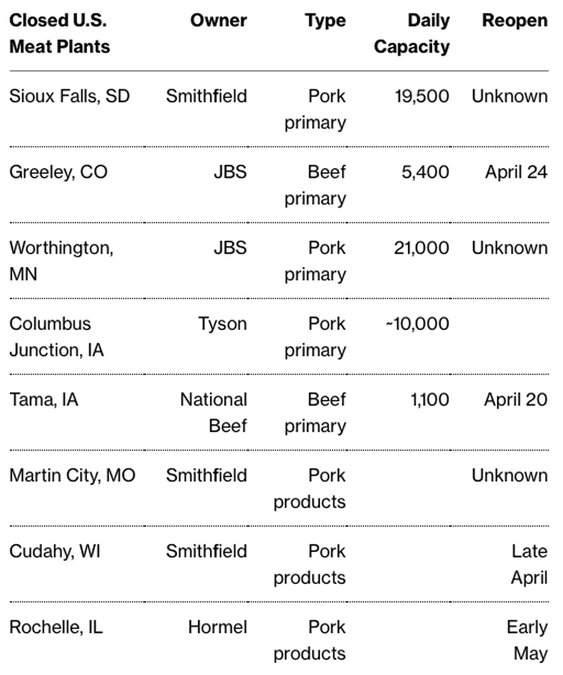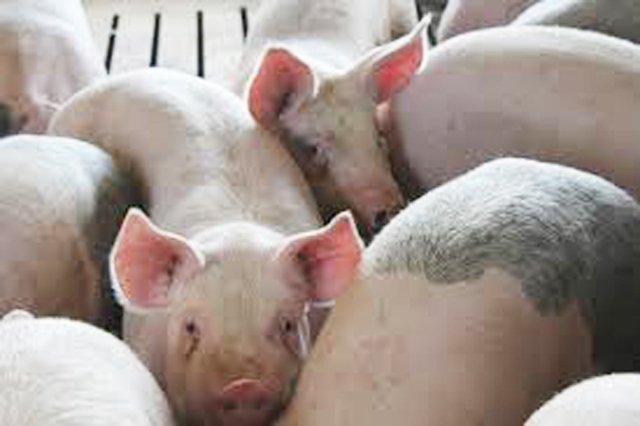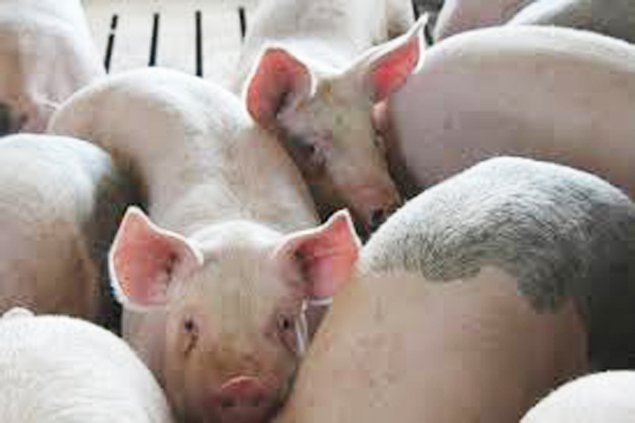DRIFTLESS - “I can’t keep up,” said Grant Stluka, the owner of the Eastman Locker about the current demand for butchering. “I’m trying to find people to hire. We’re booked out to July.”
Stluka says the COVID-19 virus infecting workers has caused the shutdown of what he called the “monster packing plants” that process 5,000 to 6,000 cattle per day. Those closures are creating lots of problems for producers and that includes many local producers.
“They’re not buying at the sale barns right now,” the local locker plant owner said. “People with fat steers have nowhere to go with them.”
The problem is affecting Seneca’s Leroy Peterson, who sells 20 to 25 hogs a week. Monday, he had 25 hogs ready and nowhere to take them. So, he’s stuck feeding them
Another farmer in the Seneca area had five steers he needed to sell to get money to put his crops in and he couldn’t sell them, according to Stluka.
“I just can’t keep up,” Stluka said several times during the interview earlier this week. “The small plants can’t keep up. There’s just so many extra animals.”
Well, how many extra animals?
A large meat processing plant can butcher as many 5,000 cattle or 20,000 hogs per day. In a week, that’s 25,000 to 35,000 cattle and 100,000 to 140,000 hogs from any given mega-meat packing plant.
At one point, Stluka said his Eastman Locker bought meat from UW Provisions to grind into hamburger and got it for $2.20 to $2.50 per pound. Now, that meat is $5 per pound and the stores need to charge $6 per pound because everything is so much more expensive.
Locally, Stluka can keep meat prices a little less expensive, because he’s buying cows from local farmers
The locker was selling quarters from about one-and-a-half steers per week. They butcher about four steers per week for quarters now.
“It’s just nuts now. We took in six full beef steers on Monday and we’ll try to do six more on Wednesday.”
Stluka recalled that a fire not long ago at a big plant in Kansas wiped out a facility that was doing 5,000 steers per day or about two to three percent of the slaughter capacity in the United States. That lost capacity alone sent big hiccups through the whole industry.
Now, there are three or four beef plants closed with capacity of 5,000 per day and another three or four hog processing plants closed with capacity of 20,000 per day.
“It’ going to get real bad,” Stluka predicted.
Not only are there plants without enough personnel to operate at capacity. The plants are being shut down because they’re centers for the COVID-19 infection. A hog processing plant in South Dakota was closed when there were 300 cases of COVID-19 among the 3,700 employees.
As for cattle, the feedlots are full and they have stopped buying cattle.
AV Roth has a 3,000-sow weanling pig operation in rural Wauzeka.
“As of today (Tuesday, April 28), 45 percent of pork supply chain is closed down,” according to Roth, who is the President of the National Pork Producers Council.
“Going into this weekend there were two million pigs backed up,” Roth explained. “And if nothing opens up and nothing else closes, there will 1.2 million more pigs backed up by the end of the week.”

Roth acknowledged there have been outbreaks of COVID-19 at the meat-packing plants, but said the plants are putting lots of precautions in place to stop the spread–including washing facilities, plexiglass partitions and lots of testing of workers.
“They’re using staggered starting times, taking temperatures, monitoring coughing, providing masks and gloves to wear having boots scrubbed and providing hand washing. Where they can’t get six feet of separation there are plexiglass partitions to separate the workers.”
Roth said if the situation with the closed plants continues there will be shortages of pork in the grocery stores in a few weeks.
“There are already places where there are cuts, they’re not getting,” roth said.
And the price will go up to the consumer, but the producer will be paid be low. Recently, producers had to take 25 cents per pound.
Another problem for the pork producers is the plants cannot take animals over 360 pounds. With cattle there is some leeway on size, but not at pork-processing plants.
Pigs have already been euthanized in Minnesota and that can be a very traumatic experience for the producers in addition to be financially catastrophic, according to Roth.
Another problem with euthanizing pigs is disposing of the carcasses. Some can be taken to rendering plant. .In Minnesota, they buried, composted or put them in landfills. Another option is to use industrial-size wood chippers and spread the remains as fertilizer on field.
“If they don’t get the plants open, this will affect the pork supply for years to come,” Roth said.
Roth had no buyer for his most recent production of weanling pigs, but was able to place them at farm in Iowa where they are being fed. He remains the owner of the pigs He hopes to get them sold when they are mature and break even on the proposition.
Roth emphasized that COVID-19 virus is not spread through eating meat and there is no reason for the consumer to avoid it.
“There’s so many animals out there, and with the very big plants shut up again, I don’t know what’s going to happen,” Stluka said.
“I’m just going to go as hard as I can to get as much done as I can for the farmer,” the locker pant operator said.
Stluka said the large plants are a breeding ground for the COVID-19 virus as workers stand shoulder-to-shoulder for a 100 yards.
The Eastman Locker slaughtered 12 hogs Monday morning and was planning to slaughter another 12 on Wednesday.
Stluka said the problem is everywhere.
Eastman Locker is located at 107 North Main Street in Eastman and can be reached at 608-874-4331.
With multiple meat processing plants closed in Iowa, Minnesota, South Dakota and Wisconsin because of large outbreaks of the COVID-19 infection. The impacts of the plant closures are rippling across the meat production industry.
Farmers are increasingly finding nowhere to take their market-weight hogs and beef cattle. This is having a direct effect on local meat producers as well.
While many consumers are increasingly turning to local options for meat and other foods, ordering online, and cooking at home.
Solar Meats, a small local meat processer in Soldiers Grove is a young company. Solar Meats reports not seeing much change in their sales – so far – due to the COVID-19 pandemic.
“Because we are such a young business, we don’t have enough sales history to determine if the pandemic is affecting us,” co-owner Rich Sitarski said. “What we have noticed more is the way that our interactions with customers has changed. We are cleaning even more, wearing personal protective equipment, and carrying orders out to people’s vehicles who prefer not to enter the facility.”
Local marketing
Sitarski said that ‘local’ is a cornerstone of Solar Meats marketing strategy.
“Many of our customers have told us that they feel more comfortable buying meat from our store or directly from a farmer because they know where the meat is coming from,” Sitarski said. “About 99 percent of our meat is produced by farmers in Crawford, Vernon and Richland counties.”
Sitarski said the business has not received an uptick in processing requests from farmers with no outlet for their market-weight animals due to the larger plant closings. He said however, that they have seen an increase in farmers approaching them for processing and packaging meat for private label on-farm sales.
Solar Meats is located at 101 Sunbeam Boulevard, Soldiers Grove, Wisconsin, and can be reached at 608-624-5525.




